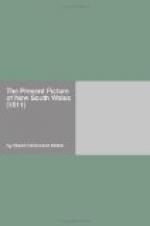An alteration in the judicial code appears also to be necessary, or at least highly expedient. In the criminal court, the judge advocate and six naval and military officers are at present empowered to decide and try delinquents; and although I believe that their opinions on verdicts have latterly been almost unanimous, yet I cannot but call to recollection a period when, painful to relate, the naval and the military were too frequently, if not generally, opposite in their determinations: Nor is this the least part of the evil; for evidence is on record of persons having been bribed, or controlled, by one or more of the members of the court then sitting in judgment, to accuse their industrious neighbour, upon oath, of crimes which he had never committed, in order to lay a ground for the ruin of the unfortunate individual, merely because his industry and prosperity in trade were objects of envy. If such a system is not suppressed, it is not possible for the human mind to calculate upon the termination of the mischiefs which may ensue from it; it is not possible for humanity to look upon the probable consequences, without emotions of horror and dismay. To prevent, therefore, the recurrence of any circumstance so flagrant and unjust, it is absolutely necessary to take some measures to render the criminal and civil courts free from every kind of prejudice; for what argument can justify the committal of the existence or the fortunes of individuals, to the mercy or the caprice of men who are blinded by prejudice.—Prejudice and party must be fatal to the progress of justice; and as the preceding remarks are nothing more than the details of facts which are notorious to every individual who has lived long in the colony, there is no occasion for my saying much in addition, to prove that a necessity does exist for some change in the judicial code of the settlement; and it is much to be wished and desired, that by that change the power may be vested in honest and incorruptible hands, which may be held out equally to punish the guilty, and to protect the oppressed; to curb the insolence of pride, and foster humble merit; and, finally, to render New South Wales an exact copy from that fine picture of freedom and justice which is represented in the mother country.




